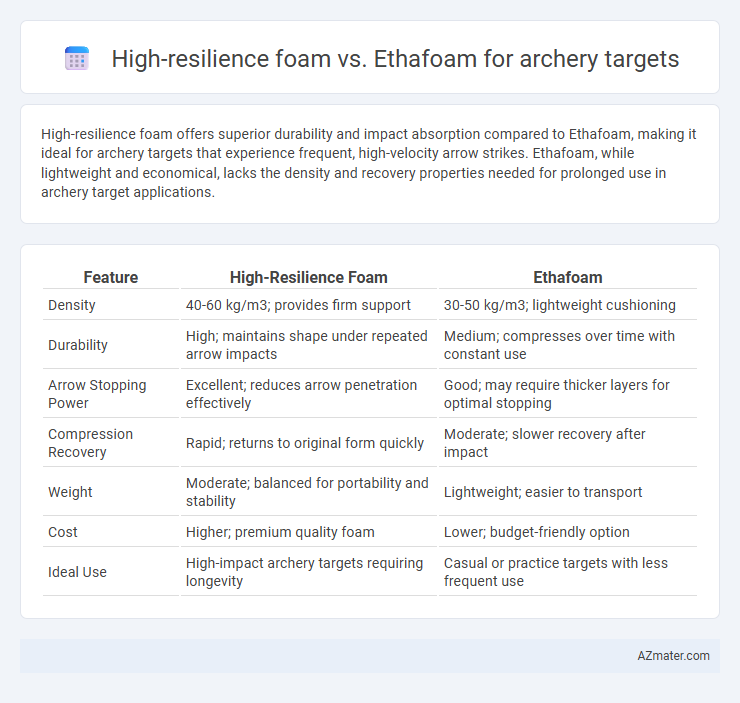High-resilience foam offers superior durability and impact absorption compared to Ethafoam, making it ideal for archery targets that experience frequent, high-velocity arrow strikes. Ethafoam, while lightweight and economical, lacks the density and recovery properties needed for prolonged use in archery target applications.
Table of Comparison
| Feature | High-Resilience Foam | Ethafoam |
|---|---|---|
| Density | 40-60 kg/m3; provides firm support | 30-50 kg/m3; lightweight cushioning |
| Durability | High; maintains shape under repeated arrow impacts | Medium; compresses over time with constant use |
| Arrow Stopping Power | Excellent; reduces arrow penetration effectively | Good; may require thicker layers for optimal stopping |
| Compression Recovery | Rapid; returns to original form quickly | Moderate; slower recovery after impact |
| Weight | Moderate; balanced for portability and stability | Lightweight; easier to transport |
| Cost | Higher; premium quality foam | Lower; budget-friendly option |
| Ideal Use | High-impact archery targets requiring longevity | Casual or practice targets with less frequent use |
Introduction to Archery Target Materials
High-resilience foam offers superior durability and energy absorption, making it ideal for archery targets that endure repeated arrow impacts without significant deformation. Ethafoam, a closed-cell polyethylene foam, provides excellent lightweight cushioning and water resistance but tends to compress under heavy use, reducing its longevity. Choosing between these materials depends on balancing target longevity and ease of maintenance for archery practice.
What is High-Resilience Foam?
High-resilience foam is a durable, flexible material known for its ability to quickly regain shape after compression, making it ideal for archery targets that require consistent impact absorption. This foam offers superior density and elasticity compared to Ethafoam, providing enhanced arrow retention and prolonged target lifespan under heavy use. With its resilient structure, high-resilience foam minimizes deformation, ensuring more accurate arrow grouping and optimal safety for repeated archery practice.
Overview of Ethafoam in Archery Applications
Ethafoam is a closed-cell polyethylene foam known for its lightweight, impact absorption, and durability, making it a popular choice in archery target construction. Its high resistance to water and chemicals ensures longevity and consistent performance under various environmental conditions. Ethafoam's ability to compress and recover quickly allows arrows to embed effectively while minimizing damage to arrow points and the foam itself.
Durability: High-Resilience Foam vs Ethafoam
High-resilience foam offers superior durability for archery targets due to its dense cellular structure that withstands repeated arrow impacts without significant deformation. Ethafoam, while lightweight and cost-effective, tends to compress and break down faster under sustained use, making it less ideal for long-term performance. Consequently, high-resilience foam maintains target integrity and shape over extended periods, supporting consistent arrow penetration and retrieval.
Self-Healing Properties Compared
High-resilience foam exhibits superior self-healing properties compared to Ethafoam, allowing it to recover quickly from multiple arrow penetrations without significant deformation. This elasticity ensures prolonged durability and consistent target performance during archery practice. Ethafoam, while cushioned, tends to break down faster under repeated use, making high-resilience foam the preferred choice for long-lasting archery targets.
Impact Absorption and Arrow Stopping Power
High-resilience foam offers superior impact absorption and enhanced arrow stopping power due to its dense, flexible cell structure that disperses energy efficiently, reducing wear over time. Ethafoam, while lightweight and durable, has a more rigid composition, resulting in less effective energy dissipation and faster arrow penetration. Archery targets made from high-resilience foam typically deliver longer-lasting performance with improved safety during practice sessions.
Weather Resistance and Longevity
High-resilience foam offers superior weather resistance, maintaining structural integrity and cushioning performance in various outdoor conditions, including moisture and temperature fluctuations. Ethafoam, while durable, tends to absorb water and degrade faster when exposed to prolonged rain or UV rays, reducing its longevity as an archery target material. Therefore, high-resilience foam ensures extended lifespan and consistent use in outdoor archery settings due to its enhanced weather-resistant properties.
Maintenance and Reusability Factors
High-resilience foam offers superior durability and maintains structural integrity after repeated arrow impacts, reducing the need for frequent replacement in archery target maintenance. Ethafoam, while lightweight and cost-effective, tends to compress permanently and degrade faster, leading to more frequent target refurbishment or replacement. The reusability factor favors high-resilience foam due to its ability to self-heal small punctures and preserve target shape over extended use, enhancing long-term performance and cost efficiency.
Cost-Effectiveness and Availability
High-resilience foam offers superior durability and better energy absorption, making it more cost-effective over time despite its higher initial price compared to Ethafoam. Ethafoam is widely available and generally less expensive upfront but tends to compress and degrade faster, potentially leading to more frequent replacements. Choosing high-resilience foam ensures longer-lasting performance and lower total cost of ownership for archery targets.
Choosing the Best Foam for Your Archery Target
High-resilience foam offers superior compression set resistance and durability, making it ideal for frequent, high-impact archery use, while Ethafoam provides affordable, lightweight protection with moderate energy absorption primarily suited for casual practice targets. Selecting the best foam for your archery target depends on factors like arrow type, shooting frequency, and budget, with high-resilience foam excelling in longevity and Ethafoam favored for ease of handling and cost-effectiveness. Understanding the density and rebound characteristics of each foam type ensures optimal arrow stopping power and target lifespan for your specific archery needs.

Infographic: High-resilience foam vs Ethafoam for Archery target
 azmater.com
azmater.com